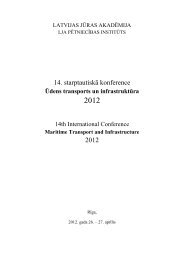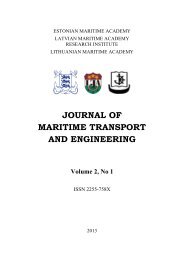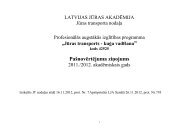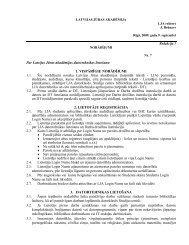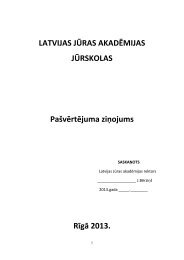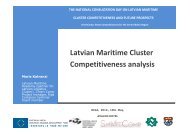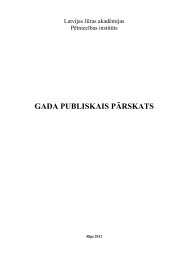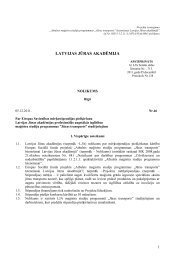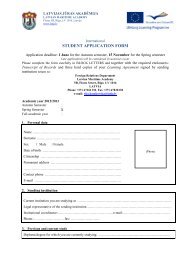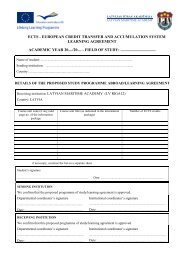Latvian Maritime academy
Latvian Maritime academy
Latvian Maritime academy
You also want an ePaper? Increase the reach of your titles
YUMPU automatically turns print PDFs into web optimized ePapers that Google loves.
These words constitute international scientific vocabulary i.e. a vocabulary of scientific and<br />
technical words, terms, formulae, and symbols that are almost universally understood by scientists and<br />
similarly used in at least two languages. International words fulfil a useful function in communication,<br />
facilitating a quick and adequate grasp of the message.<br />
Conditions for Borrowing<br />
The mere contact of two languages does not necessarily guarantee that one will borrow from the<br />
other. Speakers must have motives for the borrowing. People usually emulate those whom they admire,<br />
not only in speech patterns but also in all other respects [2]. In the course of history English has come in<br />
close contact with many languages, mainly Latin, French and Old Norse (or Scandinavian). The careful<br />
study of loan-words constitutes an interesting commentary on the history of culture.<br />
It goes without saying that the content of language is intimately related to culture. The American<br />
Indians who had never seen or heard of a gun were compelled to invent or borrow a word for the weapon<br />
when they were confronted with it. In this sense the vocabulary of a language more or less truthfully<br />
reflects the culture of a nation. Therefore it is perfectly true to say that the history of language and the<br />
history of culture move along parallel lines.<br />
Upper class Englishmen, in the days after the Norman Conquest learned the French language and<br />
used French expressions because French was the language of the new rulers of the country. The prestige<br />
factor leads to extensive borrowing from the dominant language into the lower language. Another motive<br />
for borrowing is the need filling motive. New experiences, new objects and practices bring new words<br />
into the language. Tea, coffee, tobacco, sugar, cocoa, chocolate have spread all over the world, along with<br />
the object these words refer to. Typhoons and tsunamis have not, but direct or indirect experience<br />
connected with them has.<br />
The simplest kind of influence that one language may exert on another is the “borrowing” of words.<br />
When there is cultural borrowing there is always the likelihood that the associated words may be<br />
borrowed too [3]. When the early Germanic peoples of northern Europe first learned of paved streets from<br />
their commercial or warlike contact with the Romans, it was only natural that they should adopt the Latin<br />
words for the unfamiliar type of road strata [via], English street, German Strasse.<br />
Whatever the degree or nature of contact between neighboring peoples, it is generally sufficient to<br />
lead to some kind of linguistic interinfluencing. Frequently the influence runs heavily in one direction.<br />
The language of a people that is looked upon as a centre of culture is naturally far more likely to exert an<br />
appreciable influence on other languages spoken in its vicinity than to be influenced by them.<br />
Once a borrowed word has come into widespread use, its subsequent history is like that of any other<br />
form in the language. During the period of importation, the shape of the word is subject to adaptation and<br />
variation because different borrowers imitate the word in slightly different ways.<br />
The Effect of Borrowing on the English Language<br />
If we base our conclusions on the study of the forms recorded in dictionaries, it is very easy to<br />
overestimate the effect of foreign words. The actual number of native words is extremely small compared<br />
with the number of foreign borrowings recorded. On the other hand, if we examine spoken English in<br />
familiar conversation, we find the proportion reversed. It has been estimated that less than fifty words, all<br />
of them native words, suffice for more than half our needs [4]. The proportion of native words to foreign<br />
words will naturally vary with the subject matter and any article on scientific knowledge would naturally<br />
contain a high percentage of borrowings. The careful study of such loan-words constitutes an interesting<br />
commentary on the history of culture.<br />
Since the general opinion is that English has on the whole benefitted from the adoption of so many<br />
foreign words the obvious advantage is the wealth of synonyms which have been created by the adoption<br />
of a foreign word.<br />
The English language incorporates many distinct strains. Besides the old “Anglo-Saxon,” in other<br />
words North German, element which is conventionally represented as the basic strain, the English<br />
language comprises Norman French, Scandinavian, “Celtic,” and pre-Celtic elements. English also<br />
embraces Scotch and Irish. The English language is historically most closely affiliated with Frisian, in<br />
second degree with the other West Germanic dialects (Low Saxon or “Plattdeutsch,” Dutch, High<br />
German), only in third degree with Scandinavian, who overran England in the fifth and sixth centuries.<br />
37



